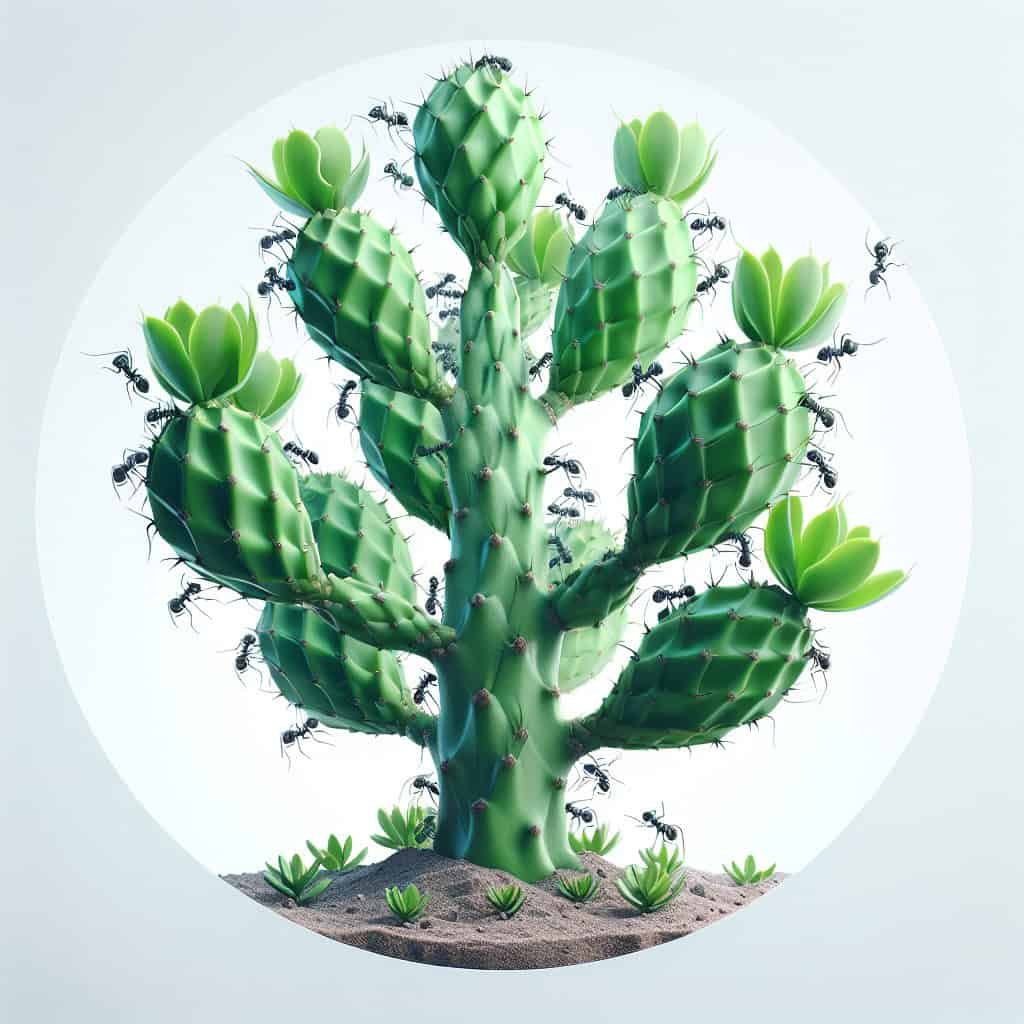If you’re a proud owner of nopal plants, you may have encountered the frustrating issue of ants marching their way onto your precious foliage. But fret not, because in this article, we’ll let you in on some helpful tips and tricks to keep those pesky ants away from your nopal plants. From simple household remedies to natural deterrents, we’ve got you covered. So, say goodbye to ant infestations and hello to lush, healthy nopal plants!
Understanding the Ant-Nopal Relationship
Ants and nopal plants have a unique relationship that can either be beneficial or detrimental to the health of the plants. The relationship between ants and nopal plants is symbiotic in nature, with ants being attracted to the sweet nectar produced by the plants. However, when the number of ants becomes excessive, they can cause harm to the plants by disturbing their natural growth and potentially spreading diseases. It is crucial to understand this relationship in order to effectively prevent ant infestations and protect the health of your nopal plants.
Identifying Ant Infestation Signs
Detecting an ant infestation on your nopal plants is essential for early intervention. Keep an eye out for significant ant activity in and around the plants. Look for trails of ants crawling on the stems and leaves of the plants, as well as around the base of the plant or the pot it is planted in. Another clear sign of ant infestation is the presence of small mounds of soil or debris near the plants, which ants use as nests or colonies. Regularly inspecting your nopal plants will help you identify an ant infestation and take necessary action before it becomes severe.

Natural and Non-Toxic Methods
When it comes to dealing with ant infestations on your nopal plants, it is always best to opt for natural and non-toxic methods. Not only are these methods safe for the environment, but they are also safe to use around children and pets.
Maintaining Plant Hygiene
Maintaining plant hygiene is essential to prevent ant infestations. Regularly clean and remove debris, fallen leaves, and decaying plant matter from the vicinity of the nopal plants. Ants are attracted to sources of food and shelter, and maintaining plant hygiene reduces the availability of these attractants.
Trimming and Pruning
Regularly trim and prune your nopal plants to eliminate any dead or decaying branches. These can serve as potential hiding spots or nesting areas for ants. By removing these, you create a less hospitable environment for ants to thrive.
Creating Physical Barriers
Creating physical barriers around your nopal plants can help deter ants from climbing onto them. Use substances like diatomaceous earth or cinnamon powder around the base of the plants to create a barrier. Ants do not like walking over these substances, effectively preventing them from reaching the plants.
Erecting Ant Traps
Creating and placing ant traps near your nopal plants can also be an effective method of controlling ant infestations. Bait the traps with sweet substances like sugar water or honey to attract the ants. Once the ants enter the trap, they will either drown or get trapped, effectively reducing their population.
Using Ant-Repellent Plants
Certain plants have natural ant-repellent properties that can help deter ants from infesting your nopal plants. Consider planting marigolds, lavender, or mint near your nopal plants to create a natural barrier. These plants release scents that ants find unpleasant, thereby discouraging them from approaching the nopal plants.
Chemical Control Options
While natural methods are preferred, there may be instances where chemical control options become necessary. Chemical insecticides specifically formulated for ants can be used as a last resort when natural methods fail to control the infestation. However, it is important to carefully read and follow the instructions provided by the manufacturer to ensure the safety of the nopal plants and minimize any negative impact on the environment.

Consulting a Pest Control Professional
If the ant infestation on your nopal plants becomes severe or persists despite your efforts, it is advisable to seek the assistance of a professional pest control service. Pest control professionals have the knowledge, experience, and resources to effectively eliminate ant infestations while minimizing any potential harm to your nopal plants. They can assess the situation, recommend appropriate methods, and provide long-term solutions to prevent future infestations.
Integrated Pest Management Techniques
Integrated pest management (IPM) techniques can be highly effective in preventing ant infestations on nopal plants while minimizing the use of pesticides. IPM focuses on identifying the specific ant species, understanding their behavior, and implementing multiple control strategies to manage the infestation.
Identifying Ant Species
Understanding the specific ant species infesting your nopal plants is crucial for developing targeted control strategies. Different ant species may have varying nesting habits, preferences, and vulnerabilities to certain control methods. By identifying the ant species, you can tailor your approach to effectively combat the infestation.
Nurturing Beneficial Insects
Encouraging the presence of beneficial insects can help naturally control ant infestations on nopal plants. Ladybugs, lacewings, and parasitic wasps are examples of beneficial insects that prey on ants and their eggs. By incorporating plants that attract these beneficial insects into your garden, such as yarrow and dill, you create a natural balance that helps control ant populations.
Applying Biological Controls
Biological controls involve using natural enemies of ants to reduce their populations. Nematodes, microscopic organisms that parasitize ants, can be applied to the soil around nopal plants. These nematodes infect and kill ants, effectively suppressing their numbers without harming the nopal plants or other beneficial insects.
Implementing Cultural Controls
Cultural controls refer to altering the environment to make it less favorable for ant infestations. This can include modifying watering practices, adjusting the lighting around the nopal plants, or implementing proper drainage systems. By creating an environment that is less conducive to ant survival and reproduction, you can deter them from infesting your nopal plants.

Preventing Ant Attraction
Taking proactive measures to prevent ant attraction is crucial in maintaining a pest-free environment for your nopal plants. By eliminating potential food sources, sealing entry points, and managing the surroundings, you can significantly reduce the likelihood of ant infestation.
Removing Food Sources
Ants are attracted to food sources, such as spilled sugar, crumbs, or food leftovers. Keep the area around your nopal plants clean and free of food debris to discourage ant foraging. Store food in sealed containers and promptly clean up any spills or crumbs to minimize the availability of food for ants.
Sealing Entry Points
Ants can enter your garden or house through small cracks or openings. Regularly inspect the surroundings of your nopal plants and seal any entry points that ants may use. Caulk gaps in windows, doors, and walls, and use weather stripping to create a tight seal. This will prevent ants from accessing your nopal plants and nesting nearby.
Managing Surroundings
Maintaining a well-groomed garden and yard can help prevent ant infestations. Clear away piles of debris or decaying plant matter that can serve as ideal hiding spots for ants. Regularly mow the lawn, remove weeds, and trim overgrown shrubs to minimize favorable conditions for ant habitation. By keeping the surroundings tidy, you discourage ants from establishing colonies in close proximity to your nopal plants.
By understanding the ant-nopal relationship and implementing proactive measures, you can prevent ant infestations on your nopal plants. Utilizing natural and non-toxic methods, consulting pest control professionals when needed, and practicing integrated pest management techniques will help ensure the health and vitality of your nopal plants. Additionally, by preventing ant attraction through proper hygiene and managing the surroundings, you create an environment that is less appealing to ants. With these comprehensive strategies, you can enjoy thriving nopal plants free from the harmful effects of ant infestations.

